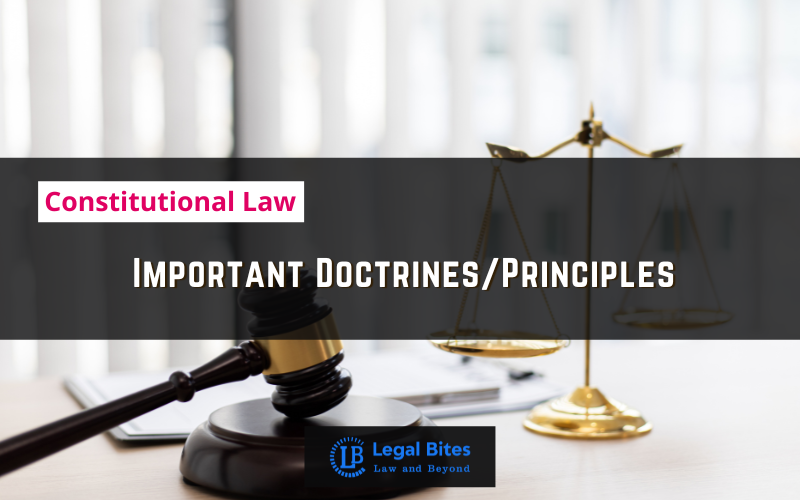Discuss the nature and the characteristics of Administrative Tribunals
Question: Discuss the nature and the characteristics of Administrative Tribunals.[BJS 2017] Find the answer to the mains question only on Legal Bites.[Discuss the nature and the characteristics of Administrative Tribunals.] Answer Administrative tribunals are agencies created by specific enactments that perform administrative adjudication. The shift from a laissez-faire society to a welfare state has led to the growth… Read More »
;
Question: Discuss the nature and the characteristics of Administrative Tribunals.[BJS 2017] Find the answer to the mains question only on Legal Bites.[Discuss the nature and the characteristics of Administrative Tribunals.] Answer Administrative tribunals are agencies created by specific enactments that perform administrative adjudication. The shift from a laissez-faire society to a welfare state has led to the growth in administrative law and in turn the administrative tribunals,...
Question: Discuss the nature and the characteristics of Administrative Tribunals.[BJS 2017]
Find the answer to the mains question only on Legal Bites.[Discuss the nature and the characteristics of Administrative Tribunals.]
Answer
Administrative tribunals are agencies created by specific enactments that perform administrative adjudication. The shift from a laissez-faire society to a welfare state has led to the growth in administrative law and in turn the administrative tribunals, maintaining and upholding the law.
The Constitution of India provides for the establishment of administrative tribunals under Article 136, although their meaning is not explicitly defined. Article 323-A and 323-B specifically talks about the setting up of “administrative tribunals” and “tribunals for other matters”.
There are a number of functions that administrative tribunals perform that have been given to them, which form its characteristics and salient features. The Supreme Court in the case of Jaswant Sugar mills v. Lakshmi Chand, [AIR 1963 SC 677] which was a case between the Sugar Mills Ltd Company and the labor union wherein the company had filed complaints against the workers for reducing production. This case gave certain specifics to determine whether an authority is considered as a tribunal, which is as follows:
- Administrative boards or officers have the power to try questions of law and fact in a manner similar to that employed by the courts and to make a decision thereon which is binding upon private individuals and affect their private rights
- Power of adjudication must be derived from statute or a statutory rule
- It must possess the investiture of the trappings of a court- such as the authority to determine matters in cases initiated by parties, sitting in public, the power to compel the attendance of witnesses ad to examine them on oath, compel the production of evidence, etc
- It is not necessary that the strict rules of evidence should be followed: and the procedures may vary according to requirements specific to cases
- They are supposed to be independent and immune from any administrative interference in the discharge of their judicial functions.
Besides these salient features of administrative tribunals there are other characteristics that define the Administrative Tribunals. They are:
- It is confined exclusively to resolve disputes between two or more parties out of which government has to be one but oftentimes it also decides on disputes between two private parties too for example election tribunal, rent control board
- The prerogative writs of certiorari and prohibition are available against the decisions of administrative tribunals. Hence tribunal cannot dispose of the matters as the final arbitrator
- Once the dispute is settled by the High Court, it cannot be entertained by the administrative tribunal. This is also known as the concept of Res Judicata under Section 11, CPC which gives finality to the judicial decisions so that one case is not litigated twice.
- They are formed to provide a forum to deal specifically with service matters to unload some burden off the other courts from their jurisdiction, by providing inexpensive and quicker relief, by abiding by the rules of natural justice and not the other guidelines such as CPC or Evidence law as done by other ordinary courts.
- Such a body as the administrative tribunals can employ engineers or specialists of its own to aid and inquire and report it in cases where it’s needed
- They have the responsibility to adjudicate judiciously and without their personal predicaments, by ensuring the highest justice is provided to the parties.
- They are conceived and constituted as an effective and real substitute for the High Court as regards service matters are concerned and the actions of the tribunals come under the check of judicial review to ensure that there is just adjudication.
Important Mains Questions Series for Judiciary, APO & University Exams
- Constitutional Law Mains Questions Series Part-I
- Constitutional Law Mains Questions Series Part-I
- Constitutional Law Mains Questions Series Part-II
- Constitutional Law Mains Questions Series Part-IV
- Constitutional Law Mains Questions Series Part-V
- Constitutional Law Mains Questions Series Part-VI
- Constitutional Law Mains Questions Series Part-VII
- Constitutional Law Mains Questions Series Part-VIII
- Constitutional Law Mains Questions Series Part-IX
- Constitutional Law Mains Questions Series Part-X



